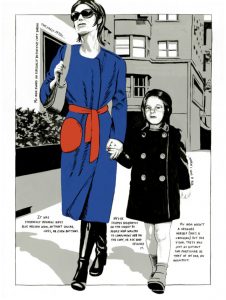I really enjoyed visiting with Julia Jacquette today. It was a unique experience to get to walk through an art exhibition with the artist–something I’ve never had the chance to do so before. I loved being able to ask her questions and hear how she interpreted her works, made certain decisions, and even to see how we would sometimes see something that wasn’t intentional on her part. One of the things that stuck out most to me was when she was explaining the process she went through curating material for each page of her memoir. Between going to the library, doing google searches, compiling pictures from her family albums–among other things–it was an extremely extensive process. And it really reminded me of a collage of sorts. Not of the physical material brought together as we saw in the examples we’d studied in class; but more so a collage she put together in her mind, repurposing all the material she collected into a new work. To this end, it made me think that we’re always doing some sort of collage in our minds. Be it bringing together sources in a paper, drawing on different influences in a work, today was a reminder of how much the works we produce are amalgamations of what we’ve learned and experienced. Julia Jacquette’s work was like this, only more so, because of all the pieces she’d purposely gone out searching for to illustrate her memory.
It was also really special to hear the personal sentiments behind each work. I’d have to say my favorite page after meeting with her would have to be the first page with her and her mother. It brings to mind a specific brightly patterned shirt I always remember my mother wearing when I was a child. I was actually able to remark upon it when I was back home for the break and we had dug it up from an old box. It brought surprisingly vivid memories and feelings of comfort and nostalgia–akin, somewhat, to what I imagine the emotions behind this page are.


It’s very interesting to think of Playground of My Mind as a mental collage put together by Jacquette. When reading the book, I did not realize the research that Jacquette had to do in order to create accurate scenes. I was also surprised hearing about the creative process of using pictures online or in databases to help sketch people in different positions.
Erica-I loved this post! You offered a really brilliant and unique perspective on the experience of visiting with Julia Jacquette. Your reaction to the experience prompted more of my own reflection. I love the idea of expanding the concept of collage-as not just a physical and artistic process but a mental one. I wholeheartedly agree-we are all constantly collaging inside our heads-in an attempt to process fragmentary experiences and make sense of each moment and day. I wonder then about the title of Julia’s graphic memoir in relation to your thought. If the book is the visual manifestation of the playground of Julia’s mind, what would an actual collage of the mind look like in terms of visual art?
The idea of Julia Jacquette’s book (and to an extent all of the essays we write and the drawings we create) being a collage reminds me of the idea of collaboration we discussed in our last papers. In My Name is Red, Pamuk writes that when miniaturists look at another artist’s work, they “ingrained his pictures in their minds” (161). This would mean that every time we look at someone else’s work, it becomes a part of our own. Therefore, whether we purposefully draw on the work of others as Julia Jacquette does or not, everything we make will on some level be an amalgamation of our own ideas and those we have experienced before. Is it possible to create anything completely original?
I think you’re conception of a collage of the mind is quite interesting, and it begs the question of whether not not any artist can create a piece of work without drawing from their past experiences. While Julia’s graphic novel deals explicitly with her childhood, I think the argument could be made that even when artists aren’t intentionally dealing with memory, it still seeps into their work. My dad was a musician for a number of years, and he used to write all of the lyrics to his songs. I remember asking him when I was younger where he drew the inspiration for his songs and he responded by saying that he wrote about the things he knew and experienced. He said all writers were the same. They write about what they know. While they take liberties and craft more elaborate plot lines, at the base of every story or song theres a piece of the person who wrote it, sitting there waiting to be discovered. I thought that was an interesting response, and I thought it resonates with what you had to say about the concept of collages in the mind.